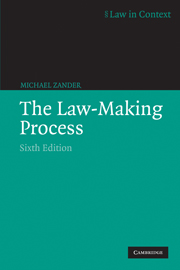Book contents
- Frontmatter
- Contents
- Preface to the sixth edition
- Preface to the first edition
- Acknowledgments
- Books, pamphlets, memoranda and articles excerpted
- Table of cases
- 1 Legislation – the Whitehall stage
- 2 Legislation – the Westminster stage
- 3 Statutory interpretation
- 4 Binding precedent – the doctrine of stare decisis
- 5 How precedent works
- 6 Law reporting
- 7 The nature of the judicial role in law-making
- 8 Other sources of law
- 9 The process of law reform
- Index
6 - Law reporting
- Frontmatter
- Contents
- Preface to the sixth edition
- Preface to the first edition
- Acknowledgments
- Books, pamphlets, memoranda and articles excerpted
- Table of cases
- 1 Legislation – the Whitehall stage
- 2 Legislation – the Westminster stage
- 3 Statutory interpretation
- 4 Binding precedent – the doctrine of stare decisis
- 5 How precedent works
- 6 Law reporting
- 7 The nature of the judicial role in law-making
- 8 Other sources of law
- 9 The process of law reform
- Index
Summary
One of the essential elements in a system based on precedent is some tolerably efficient method for making the precedents available to those wishing to discover the law. It is through law reporting that the common law is available to the profession and anyone else wishing to know the law. An unreported decision is technically of precisely the same authority as one that is reported, but until the advent of computerised systems decisions that were unreported were more or less inaccessible to all but scholars. (Now they are accessible online in utmost profusion.)
Law reporting in England goes back to the earliest days of the system.
The history of law reporting
There have been five distinct periods in the history of law reporting. The first, lasting for some two hundred and fifty years from 1282 to 1537, was the period of the Year Books. They are not law reports in the full modern sense, since they appear to have been designed more as guides to pleadings and procedure for advocates than as accounts of the decisions of the courts. They were written originally in Norman French and later in law French – a mixture of Norman French, English and Latin. In modern times they have been published in two editions – the Rolls Series (RS) and the Selden Society Series (SS). They are mainly of historical and antiquarian interest. Practitioners virtually never have occasion to consult or cite the Year Books.
- Type
- Chapter
- Information
- The Law-Making Process , pp. 306 - 329Publisher: Cambridge University PressPrint publication year: 2004



